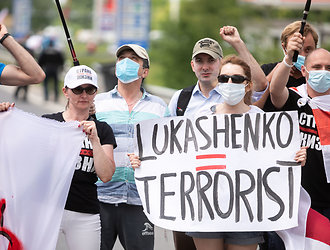
[ad_1]
The practice was revealed on Friday. Earlier, a group of Russian dissidents announced that the Lisbon authorities had transmitted their personal data to the Russian embassy and the country’s Interior Ministry.
Initially, an attempt was made to present the incident as a bureaucratic misunderstanding, but eventually the city authorities acknowledged that it was part of standard procedure. Since 2011, city officials have provided activist names, personal codes, addresses and phone numbers to countries where embassies were protesting.
City regulations require protesters to submit their data to the municipality, which forwards it to police officers to ensure that protests take place in a safe environment.
However, it turned out that the information was also shared with regimes such as Angola, Venezuela and China. This information has outraged dissident groups living in Lisbon: they are concerned that their leaders will become targets of foreign governments.
Portugal’s status as a country of political asylum has also been questioned.
“I found out this morning and I am shocked,” Alexandra Correia, coordinator of the Portuguese Tibetan support group, told Politico.
He claims that his personal data was handed over to the Chinese embassy in April 2019 when he requested permission to hold a demonstration in support of the jailed activist Panchen Lama.
“This is particularly strange because our protest took place in Camões square, which is not close to the Chinese embassy, so the city authorities cannot say that the information was transmitted for security reasons,” Correia said.
Representatives of the Palestine Solidarity Committee told the Portuguese media that they had learned that information about them had been transmitted to the Israeli embassy.
They said they were concerned that the Israeli secret services might follow their members, and pointed to a Haaretz article that claimed to have a Mossad intelligence database that included activists who spoke out against the Israeli government.
“National shame”
The scandal over the transfer of data to autocratic regimes broke out four months before the municipal elections.
On Thursday, opposition candidate Carlos Maoed called for the resignation of the current mayor, Fernando Medina.
Portuguese President Marcelo Rebelo de Sousa said he regretted the transfer of data and said that in a democracy the fundamental rights of all must be respected.
Medina apologized on the air on the national broadcaster for what he called a “bureaucratic error” caused by outdated city laws. He also accused the opposition of using the scandal to gain “political influence.” Mr. Medina recognized that it was necessary to change internal procedures so that this situation would never happen again.
Pedro Neto, director of the Portuguese section of the human rights organization Amnesty International, said it was not enough to change procedures and called on the Lisbon authorities to protect those most at risk.
The protests took place in Lisbon against the imprisonment of millions of Uighurs in China, and the city authorities provided the Chinese embassy with information that not only helps to identify the organizers in Portugal, but also their relatives in China. “It is incredible that he has been complicit in such repression in our government,” Politico told Politico.
He called the disclosure a “national disgrace” and said it reinforced the impression that “Portugal is just a small country that serves the economic giants.”
[ad_2]
